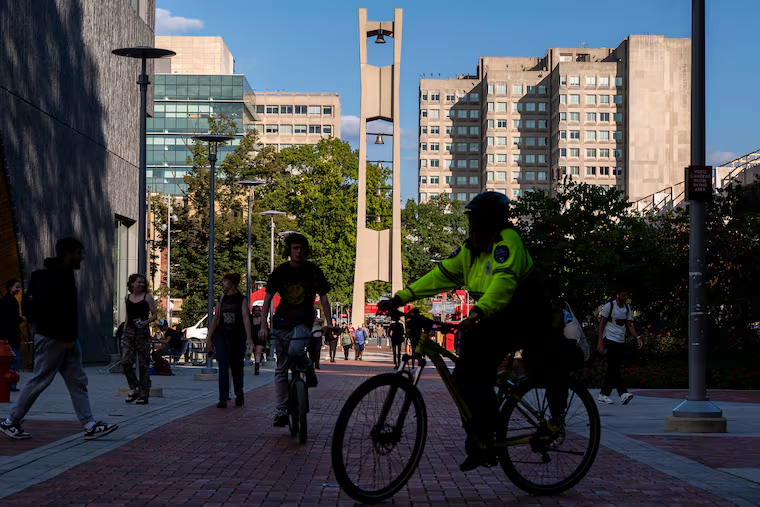As new semester gets underway, Temple cites drop in crime alongside new crime-fighting measures
New cameras that read license plates, an upgraded records management system, and new training technology are among the upgrades

Temple says it’s the first university in the commonwealth to employ license plate-reading cameras that will make it easier to spot a stolen vehicle as it travels through the university’s patrol zone.
The university police department also invested in a virtual trainer that will allow officers to experience more than 1,000 scenarios, including responding to active shooters and robberies and practicing de-escalation of tense situations and the use of force.
They are among new efforts underway at the 30,530-student university in North Philadelphia, even as the school reports a drop in crimes in its patrol zone from 2022-23 to 2023-24.
» READ MORE: More than a year after a Temple police officer was shot and killed, where does the university’s safety stand?
There has been a 19% decrease in aggravated assaults, comparing the period from August 2022 to May 2023 with August 2023 to May 2024, said Jennifer Griffin, Temple’s vice president for public safety. There were 37 such assaults in 2022-23, compared to 30 in 2023-24.
During that same period, she also cited a 20% decrease in robberies (49 to 39), a 36% reduction in theft from autos (55 to 35), and a 24% reduction in motor vehicle thefts (29 to 22).
“I feel positive about the direction we are taking, the strategy we are using,” she said. “It’s a challenging time in law enforcement. You have to be everything to everyone all the time. But we are committed to it.”
Griffin began her tenure at Temple in August 2022 as the university was experiencing one of its most difficult times in dealing with campus safety. Student Samuel Collington had been shot to death outside his off-campus residence in November 2021, prompting the university to commission a campus safety audit.
In February 2023, Temple Police Officer Christopher Fitzgerald was shot and killed while on duty, reigniting concerns.
» READ MORE: As the fall semester approaches, Temple rolls out a host of new security measures
The university has been implementing nearly 70 safety recommendations that came from the audit by 21CP Solutions, the company started by former Philadelphia Police Commissioner Charles H. Ramsey. The audit was released in April 2023, and since then, most of the recommendations have been completed or are in progress, Griffin said.
Temple last year added shuttle stops, extended walking escort service to 24 hours a day, updated more than 400 security cameras, added equipment including handguns, long guns, and radios, expanded bike and foot patrols, and changed officers’ shifts to 12-hour stints to ensure coverage and allow for alternating three-day weekends.
» READ MORE: Temple should lead a collective effort to make North Philly safer, says long-awaited report
A sense of security on campus
Griffin said the new license plate-detection cameras, which also are used by other law enforcement agencies including the Philadelphia Police Department, continue the effort to make the campus and the area surrounding it safer. Stolen vehicles, she explained, often are linked to more serious crimes.
“If we can apprehend those people before they commit another crime, that’s a benefit to us,” Griffin said. “Just within two weeks of installing it, we had an activation on the system and our detectives and police officers were able to apprehend a vehicle and return it to the vehicle owner.” The driver in the incident on the 1700 block of Fontain Street was charged with unauthorized use of a motor vehicle, Temple said.
Built by Flock Safety, the cameras, which were installed in July, work by sending “real-time alerts” to police when a vehicle connected with a suspect or missing person is detected in the Temple police patrol zone, Temple said.
The new license plate-reader cameras are in addition to the other 1,500 security cameras already active on campus and in the patrol zone.
Richard M. Englert, Temple’s president, said the system provides another benefit.
“It increases the overall sense of how secure the campus is when our students and faculty and staff hear we have that kind of technology,” he said.
The department also, for the first time in two decades, upgraded its records management system to improve communication between dispatchers and police officers, Griffin said.
Recruitment of officers remains a challenge, though Griffin said the school has made over two dozen changes to improve its application and hiring process. Seven new officers came in June, and two more started last week, with others in the hiring process, she said. The department also has added two detectives to its investigations unit, raising the total to eight, the university said.
Griffin declined to release the overall number of officers as it has in the past, saying the department would no longer disclose that information. In March, she had said the number of sworn officers stood at 81, down from 101 the previous year.
But Griffin last week said the department has enough officers to handle its calls.
“It’s not just about the number of officers but the strategy and the ways we are using them,” she said.
The department, which has a budget of about $32.5 million, also will begin using a gun detection system this semester, Griffin said. That will allow officers to respond when they detect a weapon rather than having to wait until someone pulls it out or uses it.